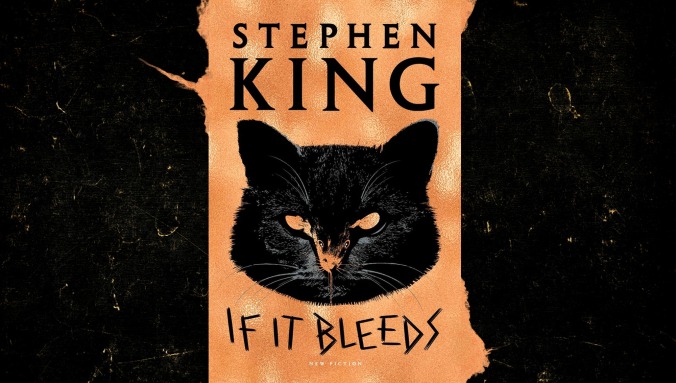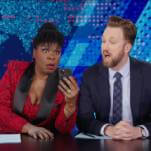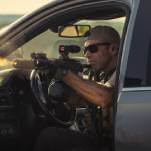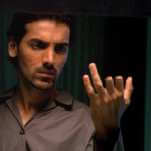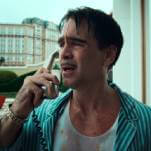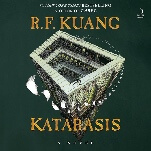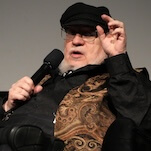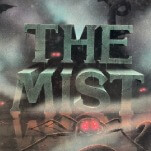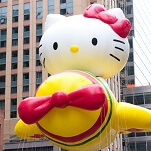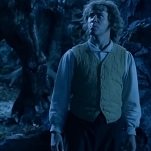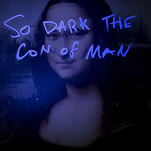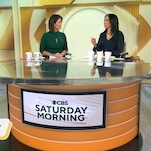Like it or not, Stephen King is making Holly Gibney happen. The character, first introduced in 2014’s Mr. Mercedes, transformed from a mousy, socially inept lost cause into an investigative savant in that book’s sequels, and went on to play a key role in 2018’s The Outsider, which was recently adapted into a series by HBO. Cynthia Erivo’s portrayal of Holly—bolder, more preternatural than repressed—improved upon the established character, but King’s If It Bleeds, Holly’s first solo outing, makes a compelling case for her as she exists on the page.
As with The Outsider, King excels at marrying the forensic techniques of procedural fiction to his supernatural premise; the story is at its best when Holly is in detective mode, analyzing old footage and comparing the myriad faces adopted by the creature. King applies the shape-shifting motif to the secondary story as well, which finds Holly putting on a mask of amiability while dealing with her emotionally abusive mother and sick uncle, who’s losing his sense of reality as his health deteriorates. They don’t quite meld with the outsider plot, and near the end they nearly derail its momentum, but they remain tender and revealing throughout, offering emotional depth for a character that desperately needed it. Holly having to revisit the home where she nearly wasted away helps give more weight to the many relationships she’s formed since Mr. Mercedes, and the balancing act she’s forced to maintain when dealing with her cruel mother helps better justify her impenetrable poker face.
If It Bleeds still reads like an alternate sketch for The Outsider, a collection of ideas that didn’t quite coalesce with that book’s creature. And King positing that this new monster could be a “cousin” of sorts to the previous one doesn’t quite hold water either. But as both a horror story and demonstration of Holly’s viability as a protagonist, it works.
Less successful is The Life Of Chuck, a story that, in the afterword, King himself acknowledges may not successfully hang together. Split into three parts and told in reverse, the story begins with the compelling concept of a world that becomes overrun with billboards celebrating a 39-year-old man nobody’s ever heard of named Chuck Krantz. From there, it splits into two explorations of Chuck’s life, one supernatural and one not, as it grasps at the tiny universes that exist within every human mind. There’s awe in King’s approach, as well as some beautiful, reflective writing about the impossibility of conveying the importance of life’s quieter revelations to anyone but yourself. As a text, however, The Life Of Chuck is little more than some existential musings built around a sketch of a character.
If It Bleeds is bookended by two satisfying, if unremarkable, stories that riff on some of King’s greatest hits. Mr. Harrigan’s Phone, with its eerie story of a cell phone that bridges a too curious protagonist with the vengeful dead, summons the specter of Christine but runs out of gas due to an ending that’s thoughtful but anticlimactic. Rat, meanwhile, gives off Shining vibes in its early going, following a mentally unstable writer who holes up in a remote cabin to write his Great American Novel as a cataclysmic storm rages outside. But it’s desperation, not madness, that prevails in this story, which is enlivened by a funny, deeply strange twist that pivots the story in a new direction. Rat isn’t particularly scary, but King, who’s always had a knack for writing about writers, deftly wrestles with the ecstatic highs and despairing lows of the creative process, especially in how both extremes can alienate loved ones.
King’s retained his gruesomeness in his twilight years—If It Bleeds begins with an explosion at a school—but the optimism he embraced in Elevation and The Institute ripples throughout these stories as well. What If It Bleeds emphasizes, though, is King’s sense of wonder; nearly every story in this collection marvels at the breadth of the human mind, the unknowability of death, and the idea that, when we all contain multitudes, we’re all, in our way, shape-shifters.
